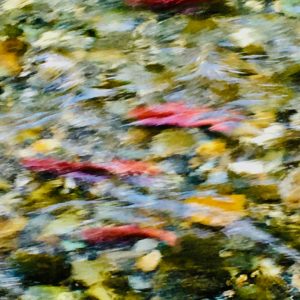Spawning
We are still a month or so from the time that the Kokanee Salmon begin spawning from Wallowa Lake heading up the Wallowa River. They spice the green-blue waters of the river the with a bright orange. Their spawning journey is a relatively short one. They come from the Lake to the river, where there is about a mile run before a waterfall. Still, the journey looks arduous enough, battling the current and leaping over rocks.
 “Spawning” means to deposit or fertilize spawn, that is, eggs. “Spawning” also implies a large number of eggs, extravagance being nature’s way of keeping the species alive. Many types of salmon have spawning runs of hundreds, even thousands, of miles. They make their way from the vast ocean up big rivers to smaller ones, finally to streams from whence they began their journey three or four years before. These days there are not only the usual challenges of predators like sea lions and orca, but the more formidable challenge of dams and of the effect of those dams on the flow and temperature of the water.
“Spawning” means to deposit or fertilize spawn, that is, eggs. “Spawning” also implies a large number of eggs, extravagance being nature’s way of keeping the species alive. Many types of salmon have spawning runs of hundreds, even thousands, of miles. They make their way from the vast ocean up big rivers to smaller ones, finally to streams from whence they began their journey three or four years before. These days there are not only the usual challenges of predators like sea lions and orca, but the more formidable challenge of dams and of the effect of those dams on the flow and temperature of the water.
How fish find their way to their spawning grounds has been the subject of lots of study, speculation and wonder.
It has occurred to me that we humans spawn, at least in a sense, as well. At different points this summer I’ve chatted with young and middle-aged men and women who all told the same story. Grandparents or parents had brought them to the Wallowas when they were kids. Now they have returned with children of their own. Like fish, they had returned to a childhood haunt, finding their way up freeways onto smaller roadways and finally onto the two land road that ends a mile south of the Lake.
They came carrying memories of swimming in the lake, picnics on on the shore, going fishing with Grandpa, maybe to the rodeo, riding the go-karts, toasting marshmallows or making s’mores over the camp fire. To some everything seemed much the same. Others found more people, even crowds, and confessed to a nostalgic “bubble burst.” But like fish they had returned. They weren’t so much depositing or fertilizing eggs (although I suppose that happens for some) as they were making and gathering memories that might, in time, lead them or their children to “spawn” this way again.
Of course, this is a summer thing for many people all across America and I am sure in many parts of the world. The return to a remembered place. To a special place hallowed by memory and association.
One of my favorite essays by E. B. White — “Once More to the Lake” — is one in which White recalls his family’s annual August trips to a New England lake, as a lead-in to recounting that same journey now with his own boy. Here’s White:
“It seemed to me, as I kept remembering all this, that those times and those summers had been infinitely precious and worth saving. There had been jollity and peace and goodness.
“The arriving (at the beginning of August) had been so big a business in itself, at the railway station the farm wagon drawn up, the first smell of the pine laden air, the first glimpse of the smiling farmer, and the great importance of the trunks and your father’s enormous authority in such matters, and the feel of the wagon under you for the long ten-mile haul, and at the top of the last long hill catching the first view of the lake after eleven months of not seeing this cherished body of water.
“The shouts and cries of the other campers when they saw you, and the trunks to be unpacked, to give up their rich burden. (Arriving was less exciting nowadays, when you sneaked up in your car and parked it under a tree near the camp and took out the bags and in five minutes it was all over, no fuss, no loud wonderful fuss about trunks.)”
White ends that essay with a twist. As he watches his son wring out his wet swim trunks before putting them back on for a another swim, he writes, “I watched him, his hard little body, skinny and bare, saw him wince slightly as he pulled up around his vitals the small, soggy, icy garment. As he buckled the swollen belt suddenly my groin felt the chill of death.”
That too is a part of it, for the spawning fish die after accomplishing their task. And for the human generations, the welcome of new generations signaling the passing of another.
![Anthony B. Robinson [logo]](https://www.anthonybrobinson.com/wp-content/themes/anthonybrobinson/images/logo.png)
![Anthony B. Robinson [logo]](https://www.anthonybrobinson.com/wp-content/themes/anthonybrobinson/images/logo-print.png)